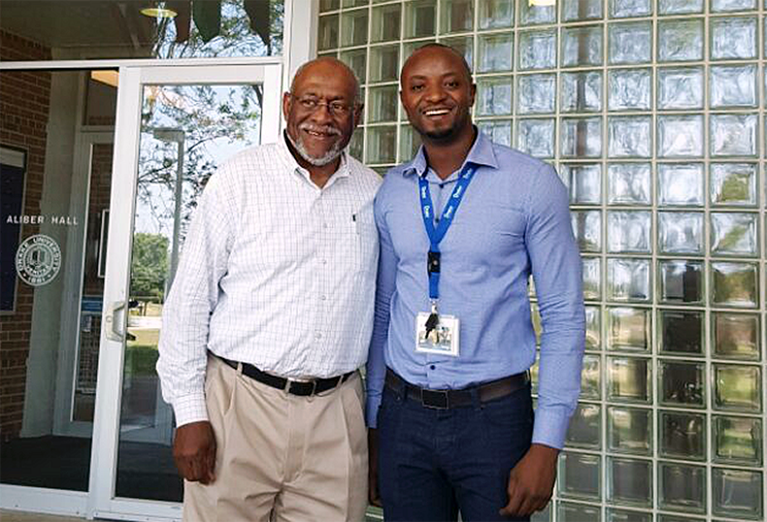From Iowa to Angola, a young entrepreneur connects farmers to consumers
Spanning almost three decades, the Angolan Civil War displaced millions of people and devastated agricultural production. Even though the conflict ended 15 years ago, the country is still reeling from its effects.
Once self-sufficient in producing food crops, Angola now only cultivates about 10% of its available agricultural land. As landmines from the war still cover vast swaths of farmland, Angola is one of the most food insecure countries in the world. One in five children die, half from malnutrition, before age five.
For Angolan Boas Fernando, he found an unlikely solution: American corn.
Linking local needs to the global agricultural industry
“Right now, Angola’s agricultural production is very low,” says Fernando. “During the war, some parts of the country were strewn with landmines and they are still not accessible.”
Nearly 400,000 tons of corn are needed in Angola each year to produce poultry feed alone. But current production levels do not meet the growing demands of the country’s burgeoning population, risking a lack of food for both people and livestock.
[The U.S. Government] invests in empowering us as youth to be creative, think big, and find ways to go beyond so that we can take advantage of existing challenges and start creating our own solutions.”
Boas Fernando, 2019 Fellowship Alumnus
When Fernando arrived in Des Moines, Iowa to study business and entrepreneurship at Drake University through the Mandela Washington Fellowship for Young African Leaders, he saw fields and fields of corn. A light bulb went off.
“When I was in Iowa, I realized I was in a state where a lot of corn is produced, the same corn that people in Angola need,” says Fernando.
“A lot of corn” is an understatement. Last year, Iowa produced an estimated 2.74 billion bushels of corn—a record-high for the state. Each year, between 10 and 20% of the U.S. corn crop is exported to other countries. These exports alone directly generated $2.72 billion in GDP for the U.S. economy and supported nearly 32,000 American jobs in 2014.
“Corn, whether in the form of feed, ethanol, or meat and dairy, is a major driver of the U.S. farm economy,” according to Chip Bowling, a farmer in Newburg, Maryland and president of the National Corn Growers Association. “Exports impact not just farmers and ranchers, but the entire U.S. economy. That’s why it’s so important that farmers and ranchers have access to international markets.”
Corn exports a win-win for the United States and Africa
As the United States is the largest producer and exporter of corn in the world, Fernando saw a natural fit with the demand for corn in Angola. Using the leadership and entrepreneurship skills he gained in the Fellowship, he began collaborating, networking, and creating relationships with suppliers in the United States to facilitate corn exports from Iowa to Angola.
“I talked with the Iowa Economic Development Authority’s International Trade Office to see how U.S. businesses could supply this product to Angola,” Fernando says. “I created the linkages and we are hopeful that we will be able to come up with a contract and start receiving supplies of corn and dairy products from Des Moines.”
With fertile topsoil and a long, warm growing season, Iowa’s corn exports support a variety of international markets, from ethanol fuel and bio-based plastics to corn meal and feed for livestock. Corn exports continue to support America’s immense agricultural sector, jobs, and economic growth—a win for both farmers in the United States and food consumers abroad.
“We’re looking at the quantity, quality, and type of corn,” Fernando says. “How much would the farmers in Iowa be able to supply, would that meet our demand, and for how long would they be able to supply us? We’re still undergoing this negotiation.”
Fernando recognizes the impact that exchange programs like the Fellowship have on local communities and hopes others recognize the value of building people-to-people and business-to-business relationships between the United States and Africa.
“Participating in the Mandela Washington Fellowship has helped me realize the support the U.S. Government has for developing countries, and in particular Africa,” says Fernando. “They invest in empowering us as youth to be creative, think big, and find ways to go beyond so that we can actually take advantage of existing challenges and start creating our own solutions.”
The Mandela Washington Fellowship is sponsored by the U.S. Department of State with funding provided by the U.S. Government and administered by IREX.
Next Story
Nyasha Mharakurwa
2016 Fellowship Alumnus, Zimbabwe